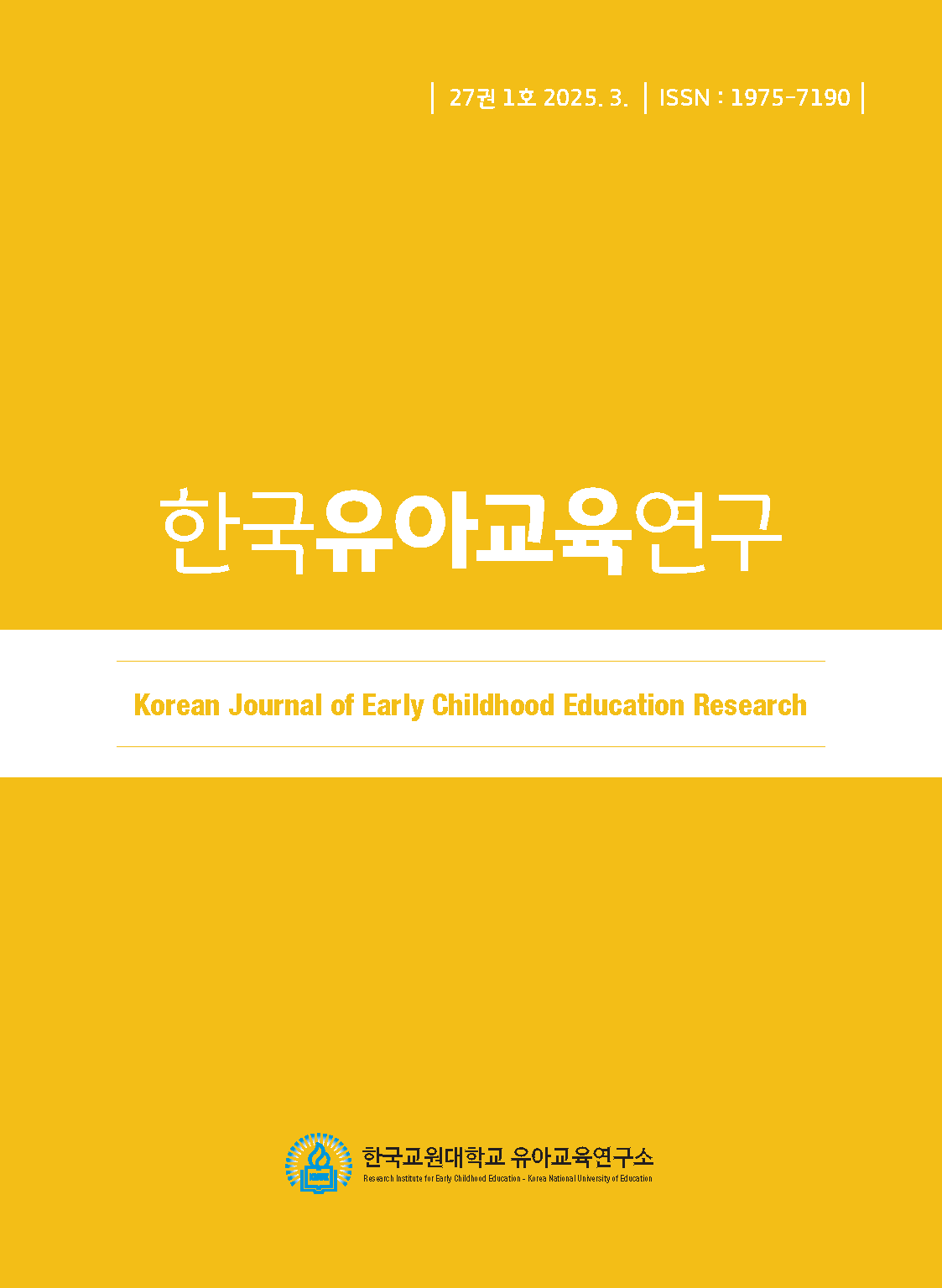유아교육기관의 자유놀이에서 놀이선호의 본질과 의미 탐색
Exploring the nature and meaning of children's play preferences in free play within early childhood education institutions
- 한국교원대학교 유아교육연구소
- 한국유아교육연구
- 제27권 제1호
-
2025.0331 - 54 (24 pages)
-
DOI : 10.15409/riece.2025.27.1.2
- 23

본 연구의 목적은 자유놀이 시간 동안 이루어지는 놀이 중 유아가 가장 좋아하는 놀이의 의미를 탐색하여 유아의 생각을 깊이있게 이해하는 것이다. 연구대상은 충청남도 소재의 A어린이집과 B유치원에 재원중인 만 5세 유아 81명이며, 연구자가 유아와의 개별 심층 면담을 통해 자료를 수집하였다. 수집된 자료는 반복적 비교분석 방법(constant comparative method)을 통해 분석하였으며, 분석 과정에서 수시로 유아교육 전문가 1인과 동료 연구자 2인의 피드백을 받아 검토하였으며 삼각측정법을 실시해 연구의 신뢰도를 높이고자 하였다. 연구결과 유아들이 좋아하는 놀이는 첫째, ‘내가 가장 좋아하는 놀이’였다. 유아들은 놀이 안에서 주도성과 자율성을 마음껏 펼칠 수 있는 ‘내가 마음대로 할 수 있는 놀이’와 유아들 스스로의 관심과 흥미를 자유롭게 담아낸 ‘내가 좋아하는 것을 담은 놀이’를 가장 좋아하는 놀이로 생각하고 있었다. 둘째, ‘놀이를 더 재미있게 만드는 요소’였다. 유아들은 놀이 중 마주했던 다양한 경험을 통해 ‘충분한 놀잇감 및 놀이공간’과 ‘허용적인 학급규칙’이 자유놀이를 더 즐겁게 만들어준다고 생각하고 있었다. 본 연구는 유아교육현장에서 자유놀이 시간이 놀이의 가장 본질적 가치인 ‘즐거운’ 시간으로 운영되기 위해서 어떠한 철학적 기반 및 방향성을 가지고 운영되어야 하는지 탐구할 수 있는 기초자료를 제공했다는 점에서 그 의의가 있다.
The purpose of this study is to explore the meaning of children's favorite play activities during free play time to gain a deeper understanding of their perspectives. The study participants consisted of 81 five-year-old children enrolled in A daycare center and B kindergarten in Chungcheongnam-do Province. Data were collected through individual in-depth interviews with the children. The collected data were analyzed using the constant comparative method, with the analysis process continuously reviewed through feedback from one early childhood education expert and two fellow researchers. To enhance the reliability of the study, triangulation was employed. The findings revealed two key aspects of children's favorite play. First, children identified their preferred play as “my favorite play,” which encompassed “play that I can engage in as I wish,” allowing them to exercise autonomy and initiative, as well as “play that includes what I like,” enabling them to freely express their personal interests and hobbies. Second, children emphasized “elements that make play more enjoyable.” They perceived that “having sufficient toys and play spaces” and “flexible classroom rules” enhanced the enjoyment of free play by providing diverse and engaging experiences. This study holds significance as it offers foundational insights into the philosophical basis and pedagogical direction necessary for structuring free play time in early childhood education. By ensuring that free play time aligns with the fundamental value of play—fun—this study contributes to the discourse on optimizing play experiences for young children.
Ⅰ. 서론
Ⅱ. 연구 방법
Ⅲ. 연구 결과
Ⅳ. 논의 및 제언
(0)
(0)